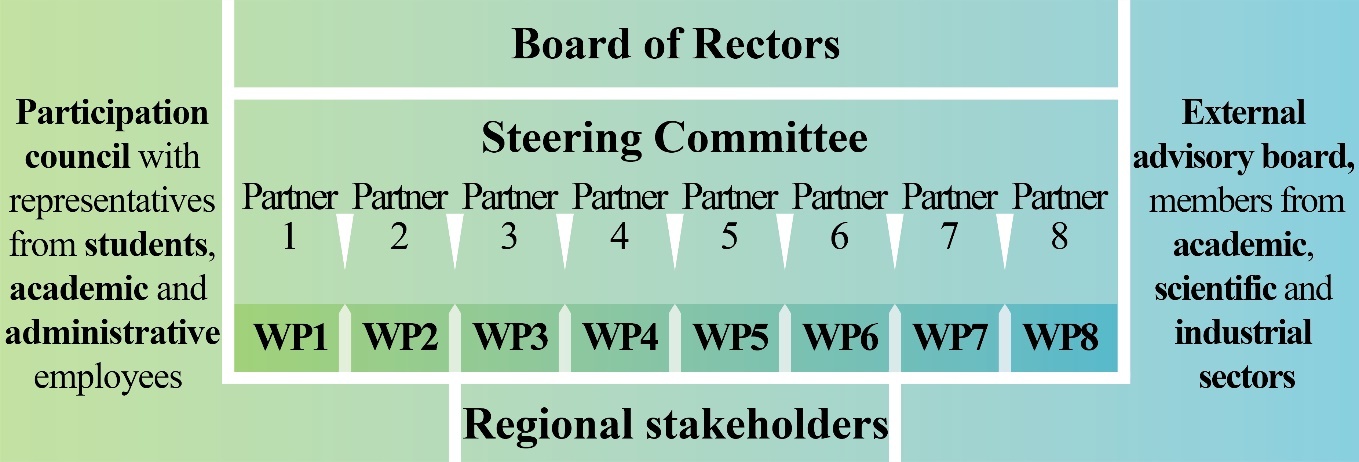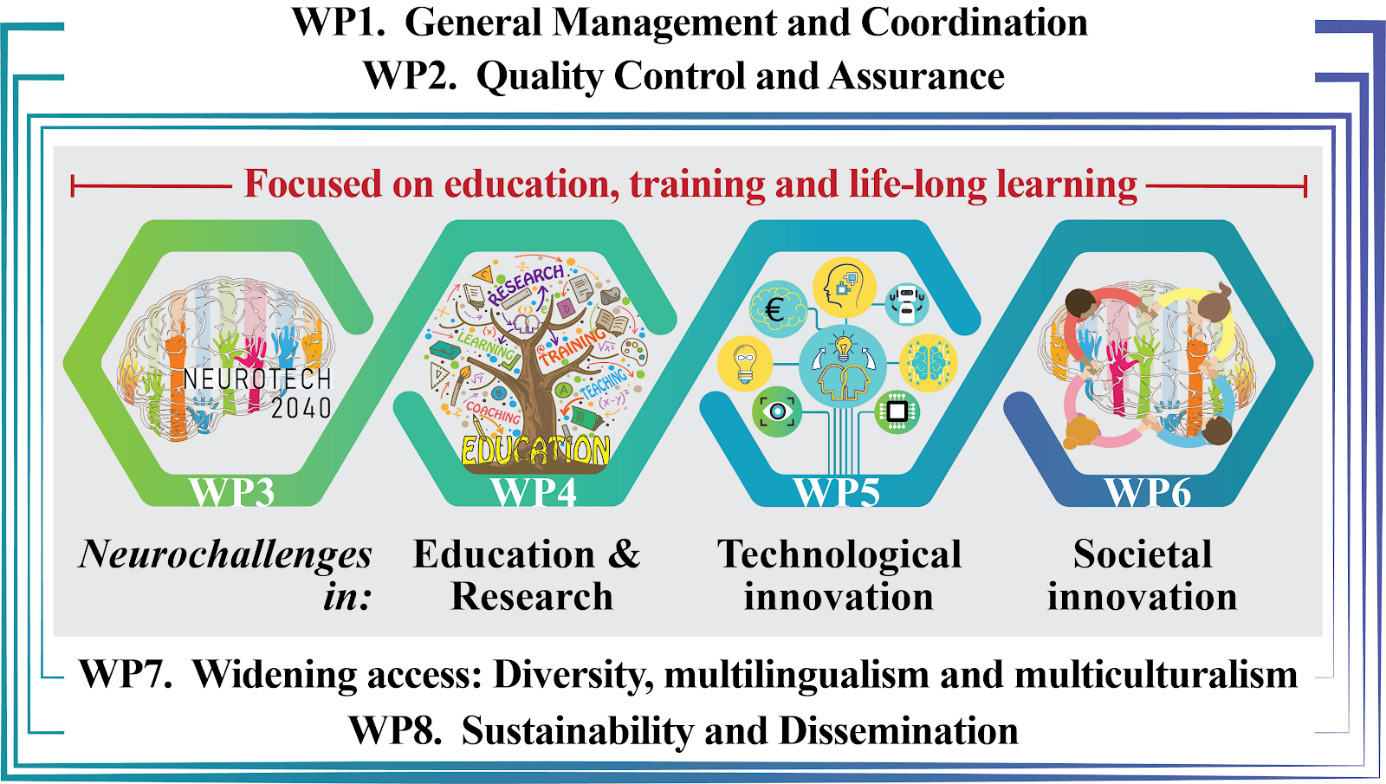NeurotechEU - Phase 1 (2021-2023)
The first phase of the project lasted 2021-2023.
Outcomes
- Established alliance organisation, management and digital frameworks for research, education and innovation activities
- Development of an efficient and inclusive way of working
- Implemented mobility and exchange programs for students and staff
- You can find all outcome deliverable reports at the NeurotechEU website and under the respective work package below
Activities
A central goal of NeurotechEU activities is the continuous integration of education, research and innovation.
- NeurotechEU activities are coordinated in work packages (WPs)
- Each partner university led one WP
- All universities had representatives in all WPs


Work packages 2021-2023
The work package 1 was coordinated by:
- Radboud University, The Netherlands
- KI representatives: Robert Harris, Maria Olsson and Ylva Olsson
NeurotechEU’s governance framework provides a dynamic, efficient and effective organisational structure for defining mission and values, project handling, resource allocation, financial management, quality assurance, and risk and change management.
Activities:
- Setting up a scalable and modular governance structure for international, multi-institutional and inter-sectoral collaboration
- Coalescing the alliance’s values, mission, and objectives into an actionable plan and put it into practice
- Monitoring the NeurotechEU accomplishments based on deliverables
- Creating a shared digital platform for administration, cooperation, and accountable resource utilisation
The work package 2 was coordinated by:
- Miguel Hernández University of Elche, Spain
- KI representatives: Anna Kiessling and Magnus Johansson
The performance of NeurotechEU and its results is measured based on structured Qualitative and Quantitative Quality Reviews (Q3R) carried out by a team of impartial educators, researchers and experts, in line with the policies established in the Neurotech Education and Research Quality (NERQ) Compendium.
Activities:
- Establishing, implementing and revising the NERQ Compendium
- Assessment of the Neurotech activities
- Ensuring quality assurance in deliverables
- Evaluation and implementation of improvements in quality criteria.
- NeurotechEU Structure: Document of Responsibilities
- Compendium: 1. Quality Plan
- NERQ Compendium: 2. Quality reviews
- NERQ Compendium: 3. Improvement Plan
- NeurotechEU Work Plan
The work package 3 was coordinated by:
- Karolinska Institutet, Sweden
- KI representatives Joana Pereira, Robert Harris, Julia Spielbauer, Maria Olsson and Ylva Olsson
The third work package (WP3) of NeurotechEU was visionary and forward looking. The task forces were coordinated in six focus groups.
Focus groups:
- Health & Healthcare
- Learning & Education
- Food & Cognition
- Biological & Artificial Intelligence
- Neurotechnology & Big Data
- Public & Politics
Activities:
- Organising focus groups focusing on neurochallenges
- Mapping the current state of the knowledge with the desired end-points in technological developments
- Creating a roadmap to reach the desired end-points, revise targets based on the developments in the field, the alliance and the society
- Future-proofing NeurotechEU's educational, research and innovation programmes
The work package 4 was coordinated by:
- University of Bonn, Germany
- KI representatives: Ola Hermanson, Lennart Brodin, Erika Franzén, Jonas Sundbäck, Teresa Sörö, Anna Dahlerus, Abishek Arora, Ylva Olsson and Maria Olsson
NeurotechEU will provide educational programmes for students, researchers, scientists,and engineers who will also be well trained in the broader European implications of scientific advances for society and economy.
Activities:
- Designing and implementing an open-source, scalable digital platform to provide blended learning for all
- Building the NeurotechEU Campus+ to train students towards their University degree
- Establishing the NeurotechEU Graduate School to train postgraduate (MSc and PhD) students and promote professionalization in an intersectoral setting
- Implementing the NeurotechEU life-long learning program for the broadest segment in society to attract new talent and redress the educational inequalities among individuals
- NeurotechEU Graduate School (GS)
- Catalogue of life-long learning programmes and its integration into CAMPUS+
- Guidelines and agreement for transfer of learning credits
The work package 5 was coordinated by:
- Boğaziçi University, Turkey
- KI representatives: Daniel Lundqvist, Mathew Abrams, Kostantios Meletis, Maria Olsson and Ylva Olsson
NeurotechEU will build innovation highways inspired by brain research and promoting technological developments to cross the boundaries of education, research and technological innovations.
Activities:
- Identifying neurochallenges that technological innovations can help solve in the foreseeable future
- Bring together the key stakeholders across sectors, including European Universities, to kindle innovation
- Design, implement and distribute future-proof neurotechnologies
- Help usher systematic removal of the remaining barriers between academy and industry, to facilitate professionalisation among trainees and promote innovation in the society
The work package 6 was coordinated by:
- Oxford University, UK
- KI representatives: Susanne Guidetti and Maria Olsson
The technological innovation in NeurotechEU will need societal innovation for community building, (societal) preparedness and adoption of new technologies to solve society’s challenges. Neurophilosophy, Neuroethics, Neurolaw will be the backbones for implementation of the advances in the field to help address societal challenges.
Activities:
- Creation of Societal Innovation hubs by bringing together the relevant segments of the society, the European Neurotech ecosystem, and NeurotechEU
- Identification of societal neurochallenges for which Neurotechnology could provide practical solutions
- Promoting the adoption of new technologies by educating the society and community building
- Creation of new degree programs at the intersection of Neuroscience, Technology and alpha sciences
- Exhibitions and innovation showcases
The work package 7 was coordinated by:
- UMF Iuliu Hațieganu - University of Medicine and Pharmacy, Romania
- KI representatives: Klara Regnö, Anna Dahlerus, Renita Sörensdotter and Viktoria Hansson
NeurotechEU will define impactful policies, processes and procedures to remove obstacles to access education, bridging inequalities in employment and create an open and transparent atmosphere for the promotion of multilingualism, inclusion and diversity.
Activities:
- Implement affirmative action to ensure social inclusion for all members of the NeurotechEU from students and researchers to staff members and administrators
- Establish widening access as an essential component of performance management and review
- Promote the acquisition of language skills and cross-cultural competences as a part of the educational goals of the NeurotechEU, and document student achievements by educational credits and certificates recognised certificates through the Alliance
- Facilitate multilingual communication and teaching, offering complementary courses in multiple languages in partnering universities
- Widening Access within NeurotechEU: summary of best practices
- Policy & Action Plan
- Catalogue for language certification in the NeurotechEU Alliance
- Dissemination content for STEM fields
The work package 8 was coordinated by:
- University of Debrecen, Hungary
- KI representatives: Ylva Olsson and Emma Hägg
NeurotechEU will actively convey its strategy and outcomes by creating a NeurotechEU community to which knowledge dissemination will go beyond the traditional university education and specifically target the last three (X, Y, Z) generations through distance learning, massive open online courses (MOOC), summer schools, certificate programs, workshops and conferences.
Activities:
- Take the lead role in exploring new funding opportunities for the continued structural support of the NeurotechEU
- Outline and implement the Communication Plan of the alliance to ensure efficient, successful, transparent communication throughout the organisational structures, as well as with the European Commission, European Universities and public
- Create, build and maintain the NeurotechEU community and integrate it with the European Neurotech ecosystem
- Set up community open days in participating universities to promote awareness, disseminate knowledge, and bring the University to the public
- Funding opportunities reports, 1
- Funding opportunities reports, 2
- BrainBee competitions, 1
